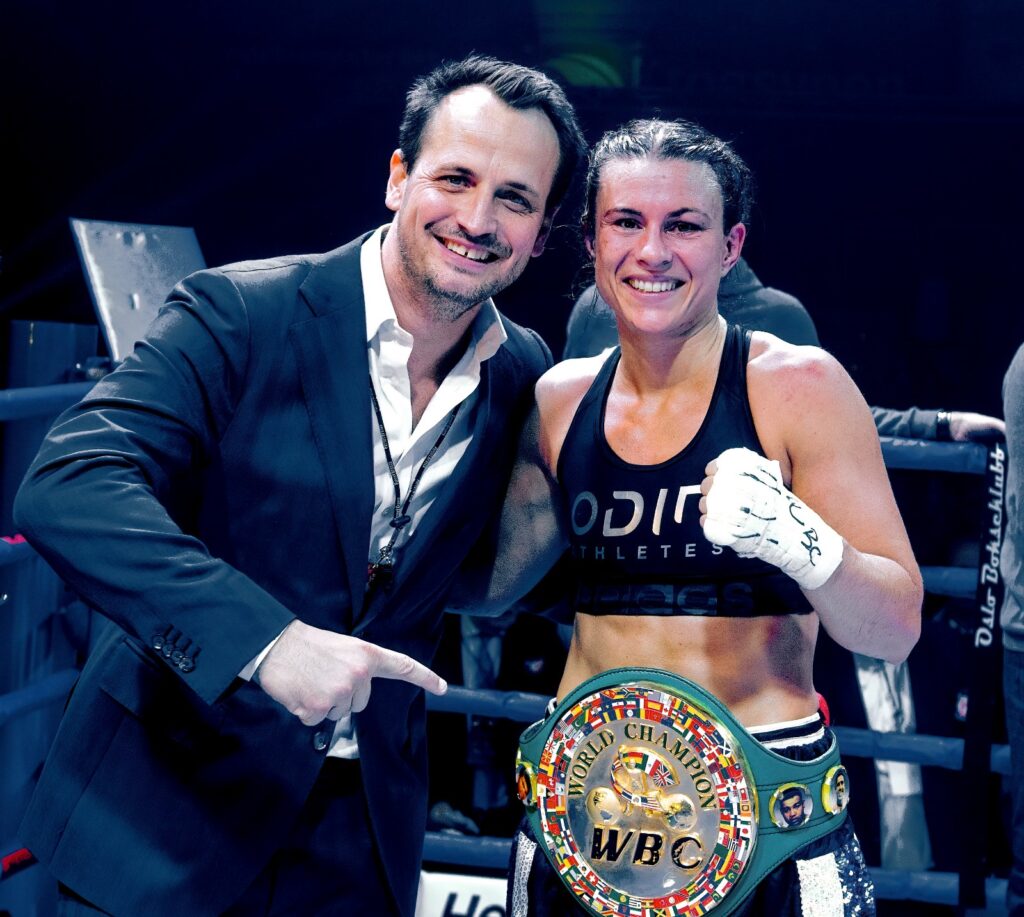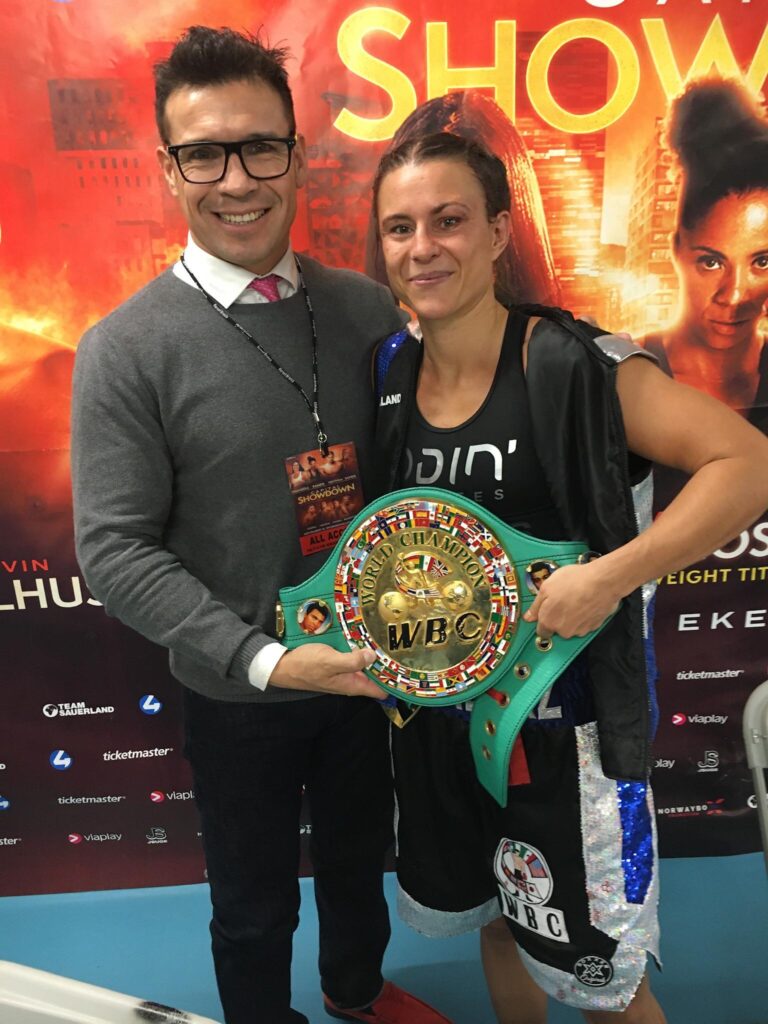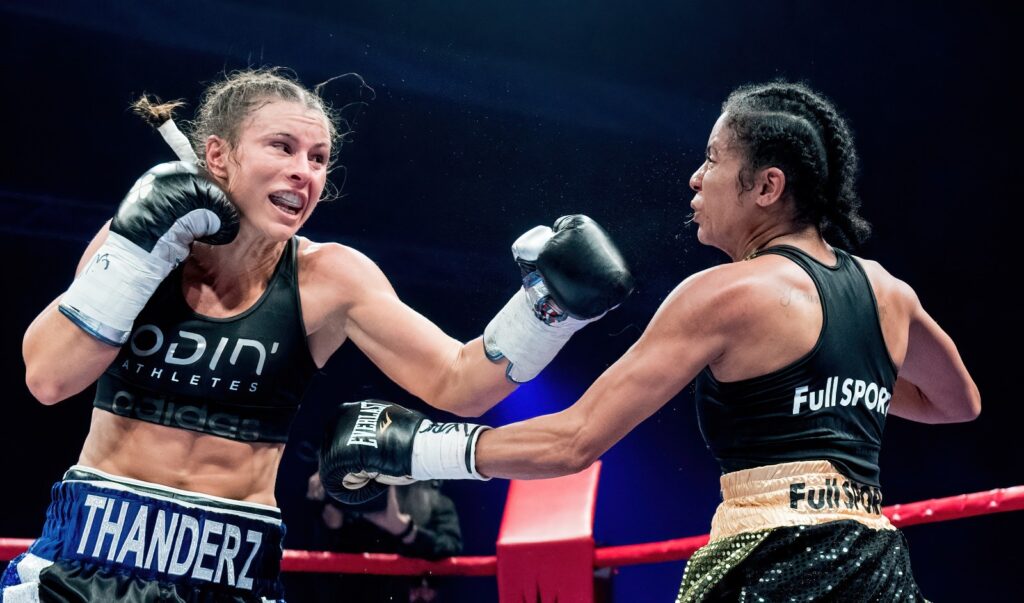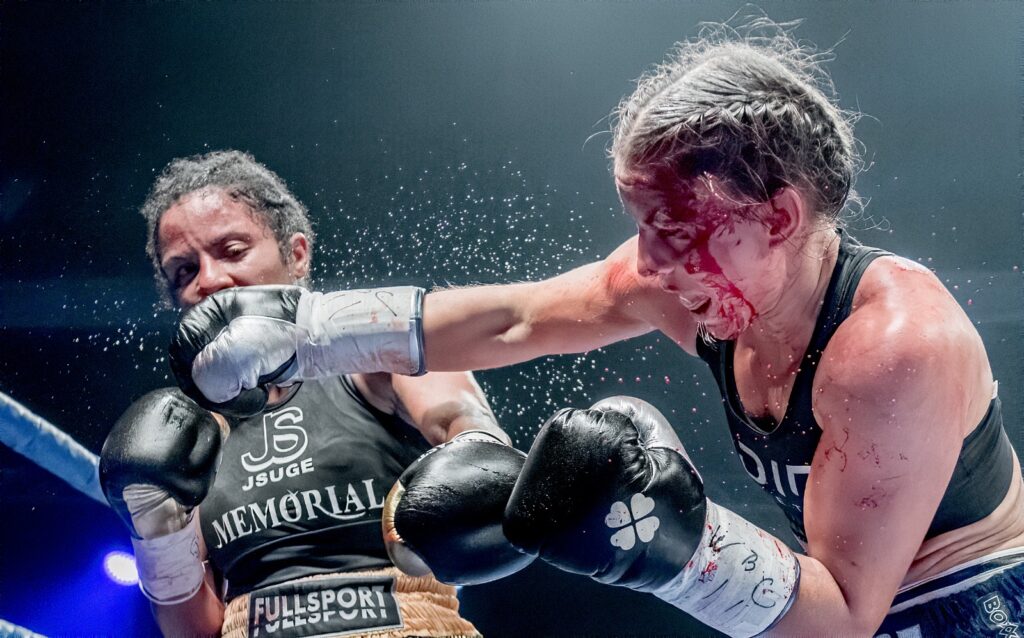WBC interim super-featherweight champion Katharina Thanderz of Norway will be watching closely when Terri Harper defends her ‘full’ world title against Natasha Jonas on August 7.
The 31-year-old Thanderz – promoted by Sauerland – was close to landing a fight with Harper back in April and is eager to test herself against the Denaby dynamo.
“I really hope to meet Terri Harper as soon as possible,” Thanderz told Boxing Social. “With me being the interim champion, I would hope to get a chance to fight her.
“We were really close to getting the fight for April 24, but I think [British] TV wanted her to face anther British fighter in Natasha Jonas. At the last moment, we found out we didn’t get the fight, which was a big disappointment for me. Sooner or later, I really want to fight her.”

Thanderz believes that Harper will prove “too strong” for Jonas and hopes to be next in line after the all-British showdown at Eddie Hearn’s ‘Fight Camp’ in Essex. However, the route to a Thanderz-Harper showdown is also complicated by Mikaela Mayer’s status as the WBC’s No.1 contender for the 130lbs crown.
Although clearly frustrated by the situation, Thanderz is so affable and good-natured that she comes across as utterly devoid of bitterness – or negativity.
The Oslo-born pugilist’s route to world level female boxing has been far from straightforward, and her background is decidedly cosmopolitan, as well as impressively varied in terms of the experiences she has crammed into her 31 years.
“I was born in Norway but when I was three years old we moved to Spain, which is where my father was raised,” she explained. “I’ve spent a lot of years living in Spain. My mother is Norwegian and my father is actually half-Swedish. That’s why I have a Swedish surname.”
Thanderz came relatively late to combat sports. “I started kickboxing when I was 18 years old. I’d always had a lot of interest in martial arts and combat sports. I asked at home a lot of times if I could do them, but that question wasn’t very popular in my house!” she said. “Although my father liked boxing a lot my mother used to come in and switch the channel when it was on television!
“That’s why I started late. Before that I hadn’t found something that I really liked. But when I first put some gloves on my hands it felt like, ‘yes, this is it!’. I was sure it was what I wanted to do from the first day I tried it.”
Although she started out in kickboxing, it was always Thanderz’s fists that did the talking. “I had very few amateur kickboxing fights. I went quite directly into professional fights – and I won most of them – but I used to get a lot of comments from judges and coaches that I needed to kick more because I was only winning with my fists!” she recalled.
It was, therefore, a natural move when, in 2012, Thanderz transitioned to traditional boxing and entered the amateur ranks in Spain. However, a period of frustration followed as she found it hard to secure many contests.
The situation was all the more frustrating because, outside of the ring, Thanderz was thriving, having moved from a job in social work to a highly successful career as an estate agent.
Nevertheless, boxing remained an itch she felt she hadn’t properly scratched.
“I had so few amateur fights and opportunities that I tried to convince my coach [Jesus Antonio Labrador] to turn professional. To start with, he was quite sceptical, but in the end it was the only way for me,” said Thanderz.
“We had a good contact in [former unified world middleweight champion] Sergio Martinez so we signed a contract with him and I had my first professional fights with his promotional company. That’s how everything started.”

pro boxing and the two remain good friends. Photo: KGZ Fougstedt.
Thanderz made her pro debut in 2016 and quickly adjusted to the differing demands of the pro ranks. “I felt more comfortable with professional boxing, perhaps because of my style,” she said. “I also think I was able to develop my boxing better in the professional game.”
Martinez was a major influence on her early career and, although he no longer promotes Thanderz, the duo’s relationship remains strong.
“He’s been a very important part of my career,” she emphasised. “We have a very nice friendship. He’s a very down-to-earth man. He’s very friendly and when I was preparing for the [Danila] Ramos fight he was often looking at my sparring sessions and giving his point of view. He has been an important influence, especially in telling me how he looks at the boxing game, strategy and so on. He always gives good advice.”
Perhaps the biggest decision Thanderz has faced in her career thus far came in 2018 when she decided to leave her job as an estate agent in order to pursue boxing full-time.
“I’d won the European championship and had the chance to fight for the WBC international title in March [2018]. I was 29 years old, I was already training twice a day and I also had this very demanding job where I had to be on the phone 24-7,” she said. “It was difficult. I was on a good income, things were good in that sense, but I was very tired. I’d go to the gym and my head would explode.
“So I took the decision to leave my job and focus just on boxing. That was in June [2018]. It was a difficult decision at first but it was a case of now or never. I wanted to try it out so at least I could say I’ve tried it.
“And I have no regrets. I can always go back to selling houses later if I want to, but a boxing career can only be at a certain time during your life.”
Thanderz’s gutsy move was rewarded the following year when she signed with European promotional powerhouse Sauerland.
“I boxed on a Sauerland show for the first time in March 2019. Then I got the chance to sign a contract with them and I didn’t think twice,” said Thanderz. “It was a really good opportunity for me. Sauerland have a lot of experience within female boxing, which is important for me.
“They also organise events in Norway and many other countries in Europe so I thought they could give me better chances in that sense. I’m very happy that I signed with them. I had one fight in Germany first and then the Ramos fight in Oslo for the WBC interim title.”

over Brazilian Danila Ramos (right). Photo: KGZ Fougstedt.
The Ramos fight, in many ways, saw Thanderz come of age in front of her hometown fans in Oslo.
“It was a very special moment. The chance to fight for that title was extremely special. We had eight or nine weeks to prepare. I trained really hard. The fight was very intense. It was a war from round one to the last round,” said Thanderz.
“I felt I was much more effective than her. She threw a lot of punches but she didn’t really connect with that many. Lots of them hit my guard or the air. When the fight was over, I had a good feeling. I felt I’d won.
“The last round was quite extreme; there was a head butt, my face was covered in blood and I couldn’t see anything. When they raised my hand, it was a very emotional moment for me and my whole team. We’ve worked so much together for many years. I’ve had the same coach since 2010. It was quite a special moment.”

split decision over Ramos last November. Photo: KGZ Fougstedt.
The opportunity to fight in Oslo was something that Thanderz particularly appreciated.
“You have extra pressure when you’re boxing at home in front of your people, but it was really nice because I had so many my friends and family there. I had a lot of people who had travelled from other parts of Norway to watch me; I had friends who I went to school with there,” she said.
“I also had a lot of people from Spain who travelled to Norway. Sergio Martinez was there, we still have a good friendship, plus all the team from Sauerland. That was amazing and made it extra special.”
And does her mother still switch the channel when boxing is on TV, now that her daughter is a professional fighter?
Thanderz laughed, and added: “My mother and father are very proud. They support me 100%. They’ve come and supported me at all of my fights in all sorts of strange towns across Spain!
“But I don’t think me fighting is a nice feeling for them. They’re quite nervous and scared for me. They say that they will always support me but that the day I quit boxing they will be very happy!”